Disclosure: This page may contain affiliate links. Please read my disclosure for more information.
You probably have a lot of creative ideas when it comes to naming your online business. It’s one of the most important aspects of starting a business. After all, your name is how customers will remember and identify you, how you’ll market your business, and how you’ll identify your business goals.
It will be plastered all over your website, social media platforms, marketing materials, and more. No pressure, right?
So, how do you choose the perfect name for your online business?
1. Choose a name that attracts the right audience

When starting a new business, it is important to choose a name that truly reflects both your brand and the audience you hope to appeal to. A name can have a tremendous impact on how customers perceive your company.
For this reason, it is essential to sit down and carefully consider what types of customers will be most likely to connect with your business. You need to have a good understanding of your audience before naming your company. Use my free Defining Your Ideal Customer Avatar template to help you define your audience.
To get started, think about the qualities or interests that define your audience – are they young or old, male or female, local or international? Do they live in the city or the burbs? Do they have pets or kids?
Consider their psychographic (interests, activities, lifestyles, opinions, attitudes, beliefs, values, and personalities) and how your product or service will help them solve their problem and get the results they are looking for.
Ask yourself, “will my name resonate with my audience”? If you’re targeting a finance customer, a name like Ugg or Squishable might not resonate with them. But a name like Ace Finance might catch their attention.
Once you’ve got an idea of who your ideal customers are, try to reflect those characteristics in the name of your business. Keep in mind that choosing a name that attracts the right audience can make all the difference in your success!
Choose the right type of business name

Business Name Categories
Choosing the right business name will help you grow your brand. There are three basic business name categories. Personal brand, business brand, and a combination of the two.
Do you want to grow a personal brand or a business brand, or both?
1. Personal Brand
A personal brand can be the first and last name of the founder when it’s a brand that’s just you or you plan to be the main focus of the brand.
2. Business Brand
A business brand might be a better fit if you plan to grow the company to have many employees or want to sell it in the future.
3. Personal and business brand combination
Depending on your business, a combination of both a personal and business brand may be the best fit. For example, Great Gardening with Sarah Smith automatically tells your audience what you do while still allowing you to be the face of the brand.
Pick a name that’s consistent with your brand

The truth is that many, if not most, of the functional names that clearly state what a business actually does have been taken for years. Not to worry, with a bit of brainstorming and creativity, you’ll come up with the perfect name for your online business.
Naming your business should be consistent with your brand. There are several types of business brand names to consider when naming your online business. I’ve listed ten different types of brand names below to help inspire your choices.
- Founder brand names
- Emotive brand names
- Descriptive brand names
- Invented brand names
- Lexical brand names
- Acronym brand names
- Geographical brand names
- Portmanteaus brand names
- Metaphorical brand names
- Brand names in other languages
1. Founder brand names
Founder brand names, as we briefly discussed, mean the founder uses their own name for the business name – a personal brand. Using your name creates credibility and trust. It’s how you present yourself, share your experiences and show your audience there is a real person behind the business that is accountable.
Depending on the type of business you’re in, creating a personal brand may work best for you. It may be appropriate to use a personal brand name if you’re a coach, designer, author, entrepreneur, graphic designer, educator, self-help guru, etc.
It may however be challenging to use your name as a business name if you have a common name such as Sarah Smith. In that case, if you have your heart set on creating a personal brand, you may want to try a combo of a business name and a personal brand name like Air Jordan.
2. Emotive brand names
Emotive brand names often use real words so an audience can immediately relate to and connect with their name. Creating a brand name that creates a distinct feeling or evokes emotion can be very impactful. An example of emotive brand names would be Innocent Drinks and The Honest Company.
3. Descriptive brand names
Descriptive brand names are the most straightforward. They literally convey in the name the product or service offered by a company. Having a descriptive brand name can benefit a new company as it educates and explains to the consumer what you do.
An example of descriptive names are Toy’s R Us, Burger King, The Weather Channel, and American Airlines.
4. Invented brand names
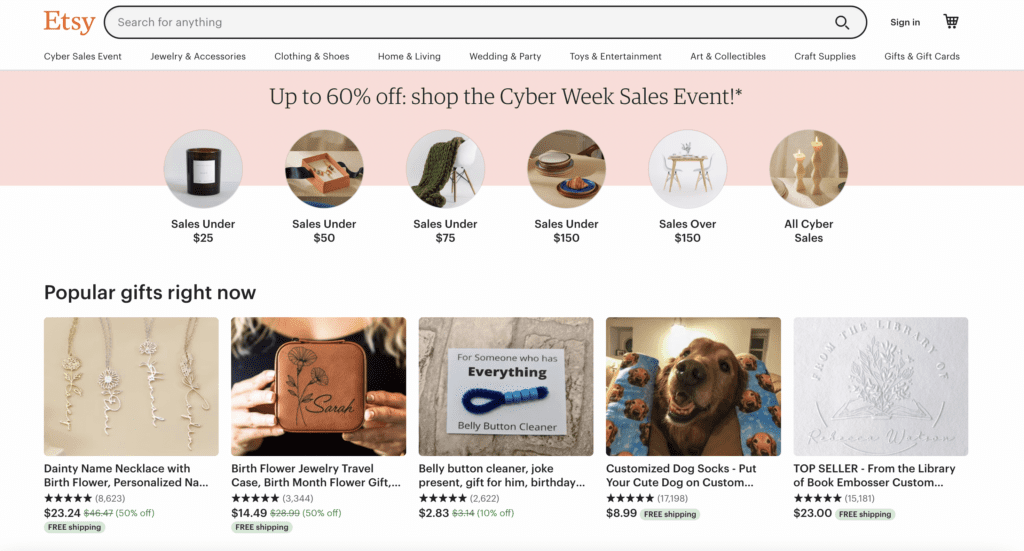
Invented brand names involve creating an abstract name and inventing your own brand name. Businesses such as Etsy and Spotify have successfully done this. This does make trademarking your name a bit easier.
5. Lexical brand names
Lexical brand names rely on wordplay to be remembered. Think about companies like KitKat, Krispy Kreme, and Dunkin’ Donuts. Lexical names rely on clever tools like intentional misspellings, puns and phrases, and compound words to catch their audience’s attention.
6. Acronym brand names

Acronym brand names, a shortened description of a name are harder to remember and require time to build a connection with your audience; many larger companies like CVS, UPS, and BMW have all had success using an acronym for their brand name.
7. Geographical brand names
Geographical brand names connect the company to its origin or a specific location like California Pizza Kitchen, Boston Consulting, and New York Life. You could use a street name, a state, or even a country.
Some may argue that using a geographical brand name limits your reach but it can be a generic name that you’ll use to create a vibe or state of mind around your company.
A few other ideas to consider when coming up with your business name are portmanteaus, metaphorical, and names derived from another language.
8. Portmanteaus brand names

Portmanteaus brand names join the sound or meaning together of two words. Two words that describe what a company does like Pinterest (pin and interest) and Wikipedia (wiki and encyclopedia).
9. Metaphorical brand names
Metaphorical brand names like Amazon or Nike are suggestive. They communicate with the audience and express an idea through the image of something else.
Amazon’s Jeff Bezos selected the name Amazon by looking through a dictionary. He chose it because the Amazon was exotic and different, which was similar to the vision he had for his business.
Nike, in ancient Greek religion, is the winged goddess of victory. Nike is one of the most recognizable sports brands in the world. Its “swoosh” represents the wing of Nike, the greek goddess.
10. Brand names in other languages
Words in other languages could make a great business brand name. Just make sure that the brand name doesn’t translate to something you wouldn’t want your business associated with. Good brand names are cross-cultural.
Know what makes a good business name
A good business name is in alignment with your company’s mission statement and vision for the brand. It articulates what you want to make your customers feel and experience. When you name your online business remember to:
- Keep it simple and easy to remember.
A complex or hard-to-pronounce name will make it difficult for potential customers to find and remember your business. - Stick to something that is short, sweet, and to the point.
- Make it memorable and something that resonates with your audience.
- A great business name will make your customer feel connected to your company by evoking a memory or feeling.
- A good brand name is visually appealing, has longevity, and is trademarkable.
- Make sure the domain name is available.
Having a good domain is essential for an online business. That means securing a domain name that matches your business name (if possible). - Research social media handles for availability.
- Avoid using common misspellings, numbers, or symbols.
While you may think this will help customers find you when they search for your business, it can actually do more harm than good. - Make sure you choose a name that can be trademarked or copyrighted.
Do a trademark search. Trademarks only protect you in the country you file in unless it’s an international agreement.
Use a Name Generator
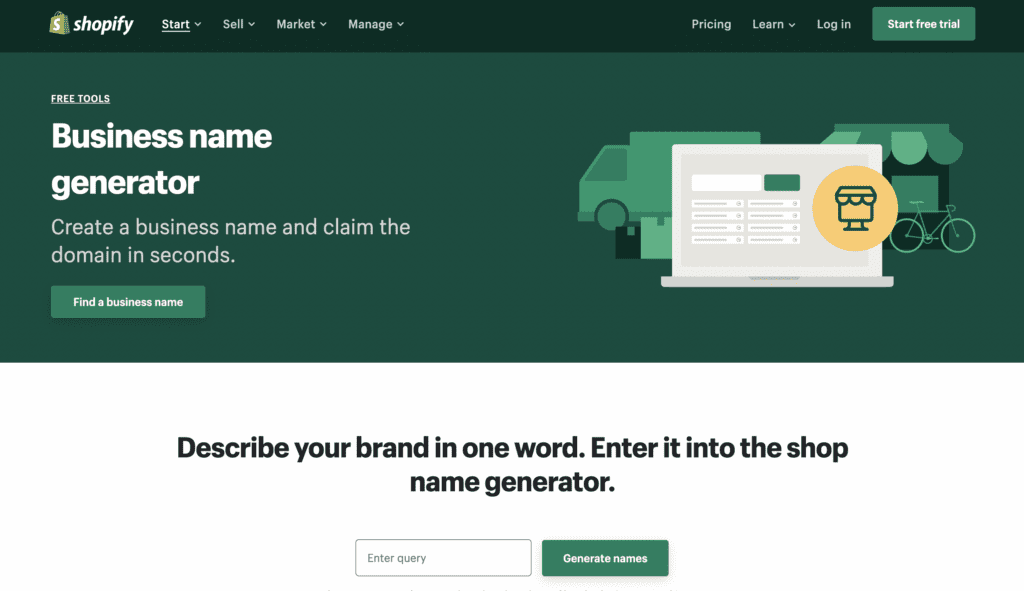
Let technology do the brainstorming for you with a name generator. Within seconds receive company name suggestions based on your customized brand preferences.
Even if the name generator doesn’t come up with your exact business name, you can use it to spark inspiration when coming up with a business name.
Shopify, Wix, and NameSnack all have a free business name generator tool you can use.
Hire someone on Fiverr to name your business
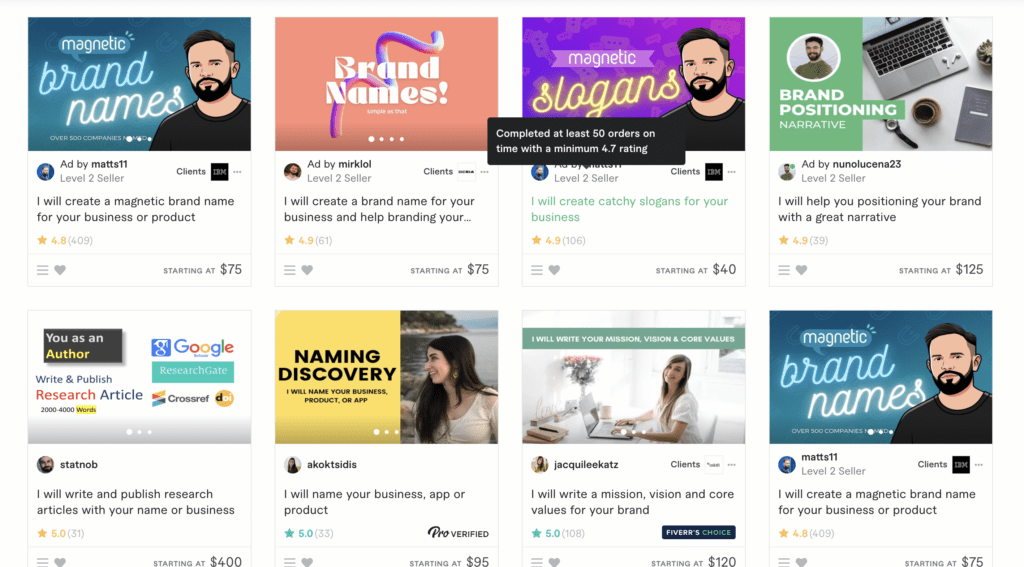
If you’re completely stumped or naming your business is not your thing, hire someone on Fiverr to do it for you. There are many branding experts, copywriters, and freelancers on Fiverr that will happily spend time coming up with magnetic brand names for your business.
Naming your business can be emotional but should also be strategic. Having an expert spend time researching your audience, business goals, and brand personality can help you reach your goals and stand out from the competition.
Naming your online business is one of the most exciting steps in the process of starting an online business. Your brand name should speak to your audience, get you results, and reflect your business and long-term goals.
With these tips in mind, you’ll be well on your way to choosing the perfect name for your online business!

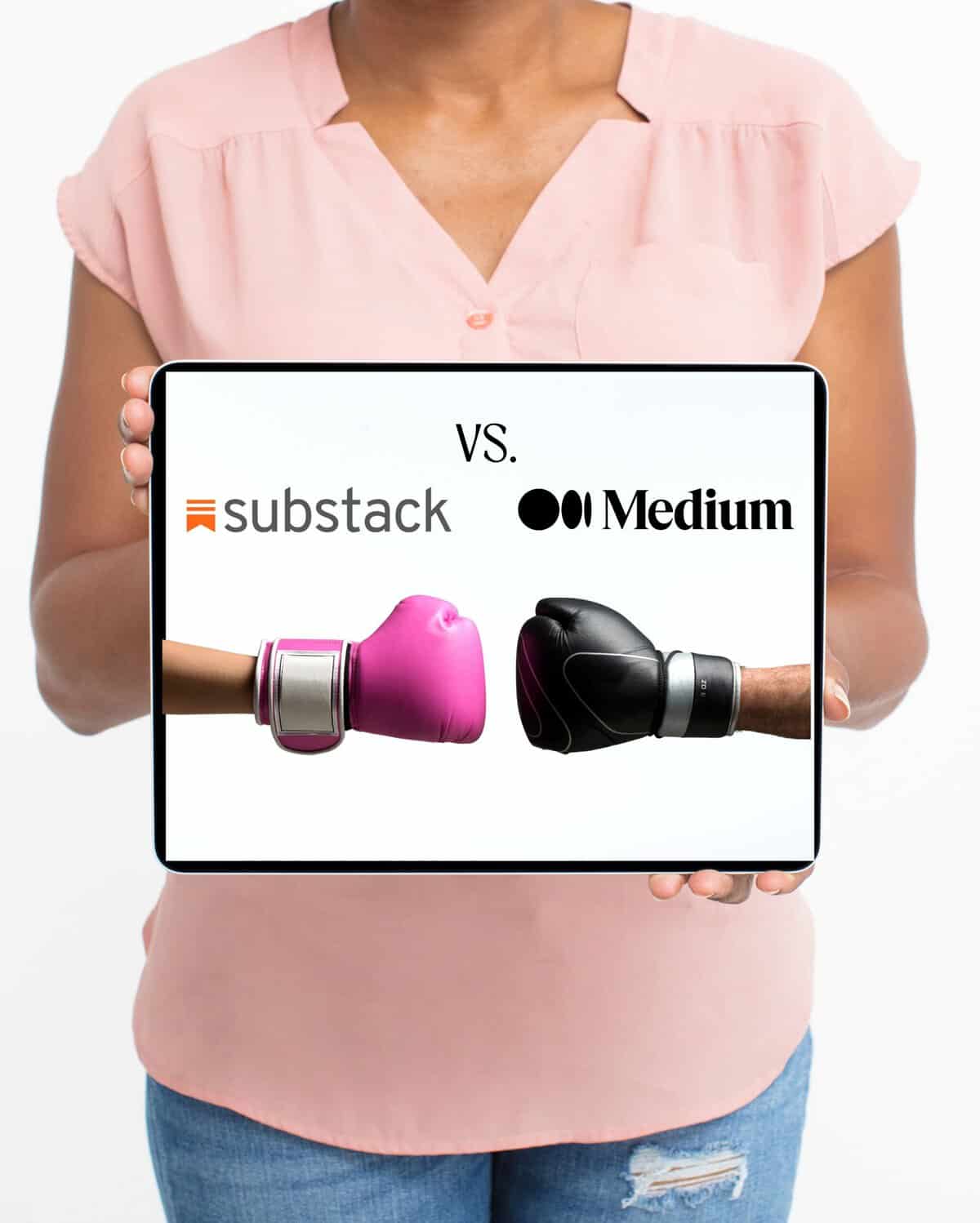
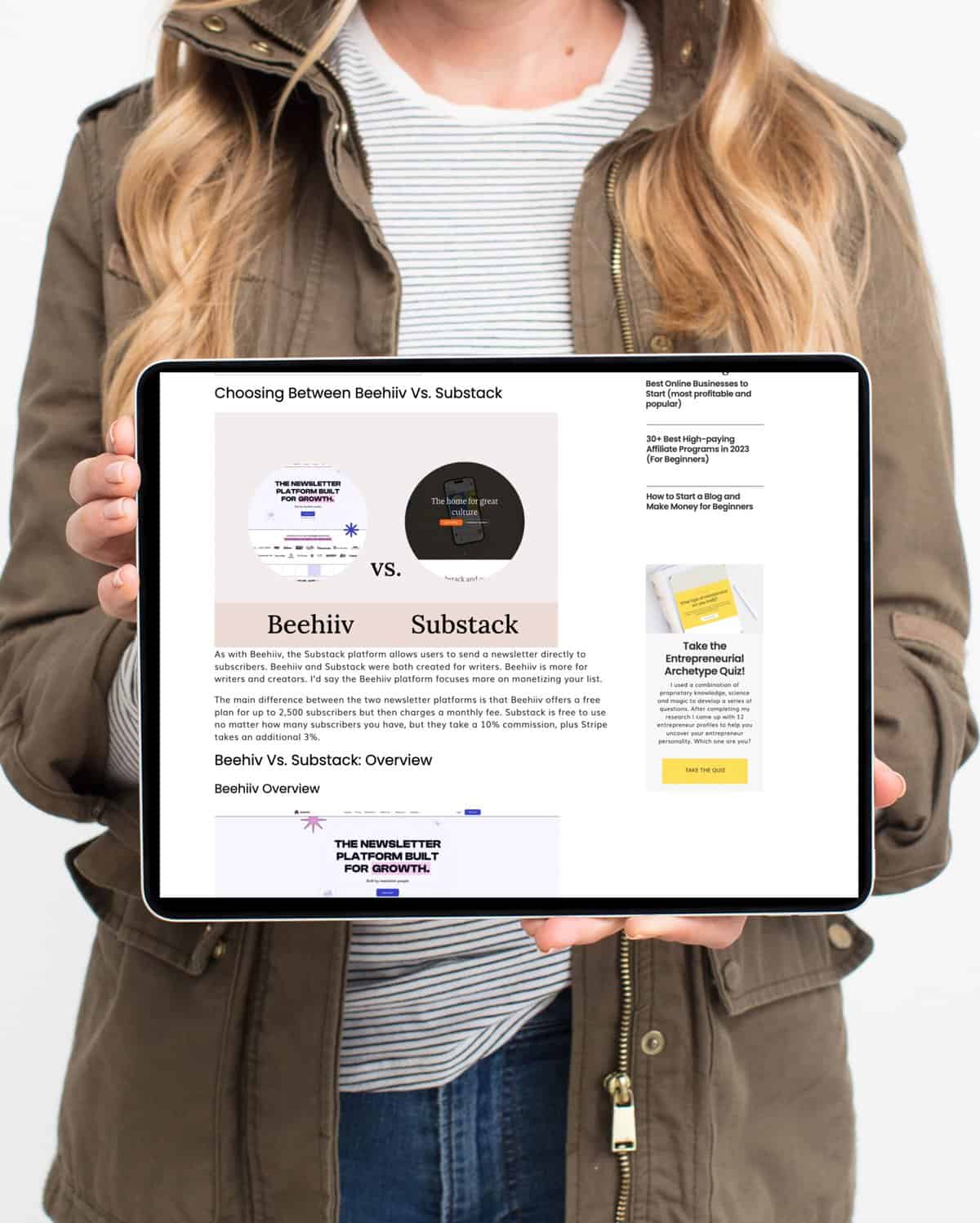




+ show Comments
- Hide Comments
add a comment